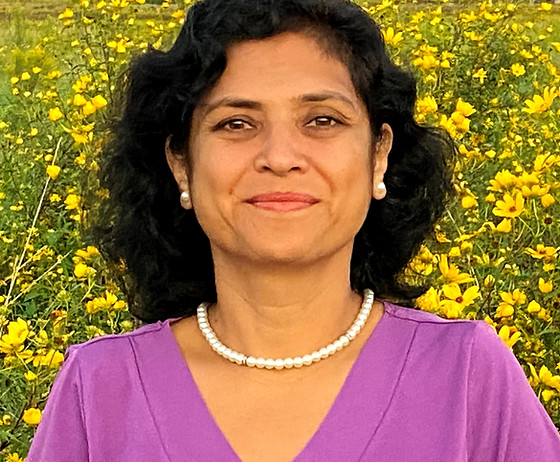When Hopewell Township voters cast or mail in their ballots they will decide between two candidates for one three-year term on the Township Committee.
This Nov. 5 general election features a matchup between Democratic incumbent Uma Purandare, the current township deputy mayor, and Republican candidate Bob Zansitis for one open seat on the Township Committee.


Purandare is seeking her second term on the Township Committee. As a member of the Township Committee, she serves as liaison to the Board of Health, Enviornmental Commission, Lawrence Hopewell Trail, and the Planning Board.
She previously served on the Hopewell Township Zoning Board of Adjustments for more than five years.
Purandare and her family have lived in Brandon Farms for more than 20 years. She has two children who graduated Hopewell Valley Central High School. Before her term on the Township Committee she was a Girl Scout leader, member of Hopewell Valley Parent-Teacher organization, managed A-Z mentoring sessions raising literacy levels, and started a Marathi language school.
Zansitis is seeking to earn his first term on the Township Committee. He has lived more than 10 years in Hopewell Township.
Zansitis founded Zansitis Painting Inc., which has been in operation for more than 30 years and also serves as a Woosamonsa Association Trustee for the Woosamonsa School House.
The Hopewell Valley News reached out to both candidates with several questions.
Has the township managed development well? Is there a specific change you would seek to advocate for on this issue if elected to the Township Committee?
Purandare: “I believe the Township has managed development well. It is important to remember that affordable housing is a constitutional requirement in New Jersey, and we can’t just say “we’re not going to do it.” Before I was elected to the Hopewell Township Committee, a bipartisan Township Committee adopted an affordable housing settlement.
“Under the terms of the settlement, parties agreed on a formula of 20% affordable housing and 80% market rate units. The Township agreed to 653 affordable units, a number significantly lower than the 1750+ units originally requested, and the ratio of market rate to affordable units was far lower than what would have been required under a builder’s remedy.
“Since I have been on the Committee, we’ve worked to ensure the developers are meeting the terms of the agreements they have signed, and we’ll continue to do so. Our new neighbors have begun to join our community, and I look forward to welcoming them with open arms.”
Zansitis: “No, I don’t believe the township has managed the new development well. The current development, focused exclusively on the southern tier, has been poorly planned, and it threatens to strain our infrastructure—affecting roads, sewage, water, drainage, and increasing traffic congestion.
“I would urge the committee to reimagine and revise their future development plans to address these issues. By distributing growth more evenly across the township, we can alleviate pressure on one area and ensure a balanced, sustainable approach that benefits the entire community.”
What is your stance on PILOT agreements in the township and do you believe they are something the township should continue with moving forward?
Purandare:”The decision to enter into PILOTs in order to meet our affordable housing requirement was made before I joined the Committee.
“I do, however, recognize that previous Township Committees faced a choice. We could have built all affordable housing on our own at a cost of between $150 and $200 million, which ends up being over $30,000 per household. With an annual Township budget of $26 million, this would be devastating. Clearly that was not acceptable.
“We could not find a builder willing to come to the Township without incentives, primarily because of the tremendous costs for infrastructure. For example, the collective cost to just secure sewer capacity from Ewing Lawrence Sewer Authority was over $25 million. This does not include the costs to build the new sewer and collection system infrastructure, nor the cost to bring public water and other utilities to the site and land costs. That left the option of a PILOT, which is commonly used in New Jersey for affordable housing projects.
“A PILOT incentivizes developers to build projects that the community needs by offering a small reduction on the property taxes otherwise owed. The Township collects 95% of the tax revenue, which is a good thing for residents as that money can be used for debt repayment, payment for necessary projects, and contributions to the Hopewell Valley Regional School District.
“In fact, the PILOT agreement specifically requires contributions to the HVRSD. And we’ve said that we will make a voluntary contribution to pay for the replacement of the trailers at Bear Tavern Elementary School, a multimillion-dollar project. I note that, as has been explained repeatedly, the recent school referendum was not triggered by the PILOTs.
“We have just received the numbers for the next round of affordable housing. It is too early to know how we will meet this requirement and inappropriate at this time to commit to using, or not using, any specific mechanism to do so.”
Zansitis: “I’m going to answer the same way I answered this question with the Hopewell Valley Neighbors Against Overdevelopment because I believe it bears repeating.
“I believe there is a negative impact on the community. The PILOT does not belong in Hopewell Township. The PILOT program was meant for urban redevelopment, not residential projects, and its misuse is unfairly burdening Hopewell Township taxpayers. I believe reforming the PILOT program is a necessary step if removal isn’t an option.
“Focusing on more accountable, community-driven solutions will help us address the shortcomings of the current program while still fostering growth. Most importantly, we must work closely with our neighboring boroughs, ensuring that all benefit from these resources and move forward together.
“This program has significantly impacted Hopewell, revealing critical shortcomings in funding allocation that have strained relationships and hindered essential infrastructure improvements. One major negative effect has been the fallout between Hopewell Township and its neighboring boroughs, Hopewell and Pennington.
“The oversight in distributing PILOT funds has resulted in 100% of the funding being directed solely to Hopewell Township, leaving both boroughs and the school district with nothing. This imbalance has not only fostered resentment and tension among local governments but has also compromised the ability of the boroughs to maintain and develop their infrastructure.
“Furthermore, the lack of funding for the school district exacerbates these issues. The PILOT funds, which were intended to support community growth and infrastructure development, did not reach the schools, forcing the district to seek an $87 million referendum from local residents for essential upgrades. This situation highlights the urgent need for adequate funding through the PILOT program, as it should serve as a crucial resource for all affected entities, including the boroughs and the school district.
“Without equitable financial support, the community faces challenges in both governance and education, undermining the overall well-being of Hopewell and its residents. Addressing these funding discrepancies is vital for fostering collaboration among local governments and ensuring that essential services, particularly education, receive the investment they deserve.”
Why should township voters vote for you to represent them on the Township Committee?
Purandare: “I moved here from a small town in rural India over thirty years ago. We were warmly welcomed by the community, and I have never forgotten that. I have volunteered with local groups, served on the Zoning Board, and for the past three years have had the honor of serving on the Township Committee. I am the liaison to the Environmental Commission, the Health Department, and sit on the Planning Board.
“I bring a unique perspective to the Township Committee—I am a research scientist, immigrant, and Brandon Farms resident. I believe in looking at facts before making a decision, and that’s what I have done for the past three years.
I am proud of the fact that the Committee has held the line on Township spending. We make hard choices to keep spending down, and this year kept the budget to a less than 2% increase. That’s well below the rate of inflation.
“We’ve worked to pay down Township debt for long-term savings. This is important because roughly 25 cents of every tax dollar goes towards debt repayment. By repaying debt, we free up that money for other uses. And we’ll continue to actively market the Pennytown property.
“I am proud that I have helped to protect the rural character of our community. Last year I led the Township’s efforts to be certified as an eco-friendly community by Sustainable NJ. And this Committee has preserved hundreds of open spaces and farmland.
“And I am proud of how we’ve worked to build a stronger community. I supported expansion of the Police Department. I launched the first multi-cultural festival in the Township. And I worked with the Health Department to expand services, which helps the health and safety of the entire Hopewell Valley.
“It has been an honor to serve, and I humbly ask for your vote so I can continue to serve everyone in Hopewell Township.”
Zansitis: “I am committed to restoring integrity and transparency within the committee, and I believe in putting the power back in the hands of the people. I will ensure your voices are heard and valued in every decision affecting our community’s future.
“With a strong work ethic and a willingness to roll up my sleeves and do what it takes, I am dedicated to fighting for what’s right and fair. Your vote is not just a choice for change; it’s a step toward a brighter future. I humbly ask for your support this November to help bring our shared vision to life.”
Story has been updated to include Uma Purandare’s responses.
